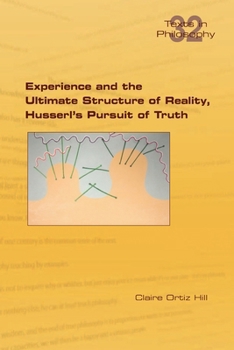Experience and the Ultimate Structure of Reality on Husserl's Pursuit of Truth
Experience and the Ultimate Structure of Reality, Husserl's Pursuit of Truth follows the evolution of Edmund Husserl's thought through those crucial years at the end of the nineteenth century and the beginning of the twentieth century when reason compelled the young doctor of mathematics to forsake empirical psychology and to strive to find the theories respecting the central traits of reality necessary to buttress the ultimate knowledge of reality he was seeking. Those theories about, to borrow Willard Quine's expression, "limning the true and ultimate structure of reality", were to be the spine he needed to back up his nascent phenomenology, which would put flesh on the purely logical skeleton he was uncovering and give it a brain and a heart.
The book's chapters chronicle Husserl's anguished search for answers to the spiny questions at the intersection of what he called the "strange" worlds of actual consciousness and the purely logical that unnerved him as he worked on logic and the foundations of arithmetic. They explore discoveries that he made about those worlds during those many years of mental travels in them as he struggled to come to clarity regarding the underlying objective structure of reality.
Related Subjects
Philosophy




